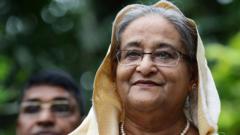Is Sheikh Hasina a Pro-Democracy Icon or an Autocrat?

Published: 2025-11-17 12:00:24 | Category: world
Sheikh Hasina Wazed, Bangladesh's longest-serving prime minister, fled the country in August 2024 amidst mass protests against her rule, marking a dramatic shift from her earlier status as a pro-democracy icon. Following a special tribunal's conviction for crimes against humanity, Hasina's 15-year tenure came to an abrupt end, characterised by violent crackdowns on dissent and widespread unrest. The aftermath of her ousting has left profound implications for Bangladesh's political landscape and its citizens.
Last updated: 26 October 2023 (BST)
What’s happening now
As of late October 2023, Sheikh Hasina has been living in self-imposed exile in India following her ousting after 15 years in power. A special tribunal in Dhaka sentenced her to death on 17 November 2024, convicting her of ordering a deadly crackdown on protesters in July and August of that year. The protests, which escalated into a nationwide uprising, resulted in the deaths of approximately 1,400 individuals, primarily due to police violence. This upheaval has not only altered the political dynamics within Bangladesh but has also drawn international attention to the country's human rights record and governance issues.
Key takeaways
- Sheikh Hasina was convicted of crimes against humanity for her crackdown on protests.
- Her rule, which lasted over two decades, was marked by economic growth but also allegations of authoritarianism.
- The protests leading to her ousting resulted in significant loss of life and raised concerns over police brutality.
Timeline: how we got here
The recent political turmoil in Bangladesh can be traced through several key events:
- January 2024: Sheikh Hasina wins a controversial fourth term in elections widely deemed as fraudulent.
- July 2024: Protests erupt demanding the abolition of civil service quotas, escalating into a broader anti-government movement.
- 5 August 2024: Police violence peaks; Hasina flees as crowds storm her residence in Dhaka.
- 17 November 2024: A tribunal in Dhaka convicts Hasina of crimes against humanity, sentencing her to death.
What’s new vs what’s known
New today/this week
Recent developments include Hasina's ongoing exile in India and the international community's reactions to her conviction. The special tribunal's ruling has intensified scrutiny on Bangladesh's human rights practices and governance.
What was already established
Prior to her ousting, Hasina's government faced accusations of authoritarianism, including political repression, enforced disappearances, and extrajudicial killings. These issues have been documented by various human rights organisations over the years.
Impact for the UK
Consumers and households
For UK citizens, the political upheaval in Bangladesh could affect trade relations, particularly with the garment industry, a significant sector in Bangladesh's economy that supplies clothing to UK retailers. Increased instability might lead to disruptions in supply chains and impact prices.
Businesses and jobs
The political situation has implications for businesses operating in Bangladesh or those reliant on Bangladeshi imports. Companies may need to assess risks associated with potential civil unrest and changing regulations as the new government establishes its authority.
Policy and regulation
UK policymakers may need to consider how to engage with Bangladesh's new government, especially in terms of trade agreements and human rights standards. There may be calls for scrutinising the ethical implications of continued trade with a country facing human rights abuses.
Numbers that matter
- 1,400: Estimated number of deaths during the protests leading to Hasina's ousting.
- 700: Cases of enforced disappearances reported since Hasina's return to power in 2009.
- 25 million: People lifted out of poverty in Bangladesh over the last two decades, according to the World Bank.
- £2.9 billion: Cost of the Padma bridge project, a key infrastructure initiative under Hasina's government.
Definitions and jargon buster
- Crimes against humanity: Violations that include widespread or systematic attacks against civilians, such as murder, extermination, and torture.
- Awami League: The political party led by Sheikh Hasina, historically significant in Bangladesh's struggle for independence.
- Enforced disappearance: The act of abducting a person, followed by a refusal to disclose their fate or whereabouts.
How to think about the next steps
Near term (0–4 weeks)
The immediate future will likely see continued tensions as the new government consolidates power and addresses the aftermath of the protests. Monitoring the response from both the Bangladeshi population and the international community will be crucial.
Medium term (1–6 months)
As the February elections approach, the political dynamics in Bangladesh may shift further. Observers will be watching for any signs of political repression or attempts to silence dissent, as well as how the new government plans to address economic challenges.
Signals to watch
- Noteworthy indicators include public sentiment towards the new government, potential protests, and human rights reports from NGOs.
- International responses, particularly from the UK and EU, regarding trade agreements and human rights conditions.
Practical guidance
Do
- Stay informed about the political situation in Bangladesh, especially if involved in trade or business there.
- Engage with ethical investing practices and consider the human rights records of countries you do business with.
Don’t
- Don’t overlook the potential impacts of political instability on supply chains and pricing.
- Don’t ignore calls for accountability regarding human rights abuses in Bangladesh.
Checklist
- Review your supply chain for dependencies on Bangladeshi goods.
- Assess the ethical implications of your business practices in light of the situation.
- Stay updated on human rights reports and international reactions.
Risks, caveats, and uncertainties
The situation in Bangladesh remains fluid, with significant uncertainties surrounding the new government's capacity to govern effectively and address the underlying social and economic issues. There are also risks associated with potential escalating violence or further human rights violations as the political landscape continues to evolve.
Bottom line
The fall of Sheikh Hasina marks a pivotal moment in Bangladesh's history, with far-reaching implications for its political landscape, economy, and civil rights. Moving forward, it will be crucial for both the Bangladeshi population and the international community to hold the new government accountable while navigating ongoing challenges related to governance and human rights.
FAQs
What led to Sheikh Hasina's ousting?
Sheikh Hasina was ousted following mass protests against her government, which escalated into a nationwide uprising marked by violent crackdowns. The protests were driven by demands for political reform and an end to her alleged authoritarian rule.
What are the charges against Sheikh Hasina?
Sheikh Hasina faces charges of crimes against humanity related to her government's violent response to protests and accusations of enforced disappearances during her tenure. She has denied all charges.
How has Bangladesh's economy been affected by the political turmoil?
The ongoing political instability has raised concerns about trade relations and economic growth in Bangladesh. Critics argue that mismanagement under Hasina exacerbated the country's economic challenges, including rising inflation and dwindling foreign exchange reserves.



